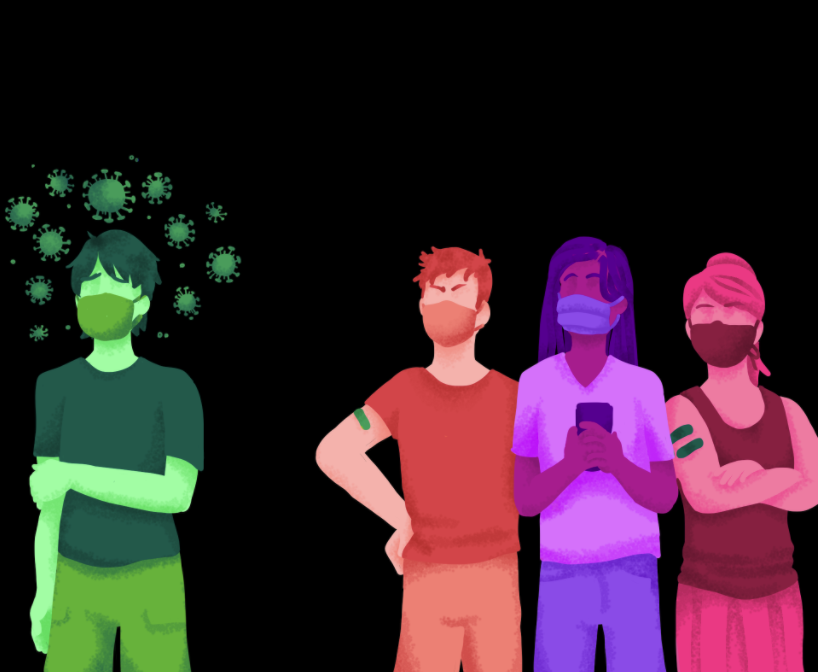Graphic showing three students expressing their dislike of a student with COVID Bucky Bonifazi // Publicity Center
By Caylee Caldwell
The spread of COVID-19 caused a worldwide lockdown still being enforced in many places today even with vaccines being distributed, but with the lockdown, more than just education and work have fallen apart and put back together again.
Social life, besides being spaced out, has changed too. New taboos have been made, habits created and ideals reworked. One of these new taboos affecting social interactions today is actually contracting COVID.
A person can catch COVID in a number of ways, whether they are following the Center for Disease Control [CDC] guidelines or not, and while this may be true, the way people view someone who has caught COVID doesn’t tend to change.
Before spring break this year, Executive Director of the Health and Wellness Center Dr. Sislena Ledbetter sent out a concerned message to the students of Western due to an increase in COVID cases on campus and in Bellingham.
“Initially contact tracing efforts identified off-campus parties and other large social gatherings as the cause for this increase,” Dr. Ledbetter, said in the email.
This is one of the reasons contracting COVID has become a taboo in today’s world, because it leads to assumptions about what people were doing when they contracted the virus.
First-year student Bridget Miller experienced the fear of what people will think of her first hand in the first week of her fall quarter as she discovered she had COVID the week she moved in.
“I was definitely very worried about not making friends because even without having COVID. I assumed it would be difficult considering there weren’t as many people on campus as there usually was,” Miller said.
When Bridget finally got to come back to her main dorm building, she was eager to meet people and finally have the college experience she had been hoping for. While she was honest with anyone that asked, Bridget was hesitant to bring up having contracted COVID.
“I am always embarrassed to say that I had COVID because I think it makes some people see me as a careless, irresponsible teen who doesn’t care about other people’s health,” Miller said.
Beyond fearing what people might think, Bridget also missed out on the long awaited first weeks of college life and the experience of meeting new friends.
Ainsley Shearer, another student at Western, had a similar experience, though she contracted COVID at the end of fall quarter. Shearer was nervous as well when it came to the way people would look at her after having COVID.
“I definitely felt nervous to tell people that I got sick because it implies that I did not do my part in protecting myself and others,” Shearer said. “I know that is not the truth but I did not want people to assume that I was being socially irresponsible.”
Ainsley still isn’t sure how she actually contracted COVID, as she wasn’t doing anything risky or against CDC guidelines. This is the case for many students that COVID, and while there are a number of people that can contract the virus due to risky behaviours or a disregard for the rules, that is not the case for everyone.
“This was very difficult. I contracted COVID possibly from the bus or maybe from the grocery store. I did everything that I was supposed to and still got sick,” Shearer said. “That’s the tricky thing about this illness and as students we should not villainize those who contract the virus. There is no way to find out how and why you get sick.”
Emmy Gregg, a Resident Advisor [RA] for the Edens-Higginson community, experienced a different side of this situation acting as the support for the students that get COVID. Fortunately, Gregg has only had a few students in her building get COVID and the students that did worked more closely with Western’s Student Health Center.
RAs write reports for students that get COVID if the student chooses to seek support, but Gregg has had few students choose to do so. Gregg hasn’t seen very much of the villainization that some students talk about, but she understands how it could be a problem.
“I think society stigmatizes those who test positive for COVID because it is easy to shame them and blame them for testing positive. Dorms are such a close living space, and even though we have precautions in place to prevent the spread, some students are more at risk than others,” Gregg said.
Even after having COVID, Miller still understands why people are wary or quick to judge in certain situations as she has done it herself.
Part of this comes from seeing groups of people ignoring the effects of COVID or the guidelines set by the CDC, especially after getting it while being safe and conscious.
“I have to remember that not everyone who gets the virus is irresponsible and that it’s important to be compassionate and understanding to anyone who gets the virus because it’s definitely not a fun experience, especially since you have to go through it alone,” Miller said.
While every person who gets COVID experiences the virus differently, and it can be contracted in many different ways, it is still seen as taboo to have it, especially in such close living spaces such as on campus housing.
As vaccines are now being offered and the pandemic appears to be on a downslope, this idea is not gone, and if anything, it only grows as the vaccine becomes more available. “I think that the best thing that everyone on campus can do to prevent the villanization of contracting COVID is to understand that each case is unique. When I got sick I felt that I could not share my story because of what others might think,” Shearer said.

